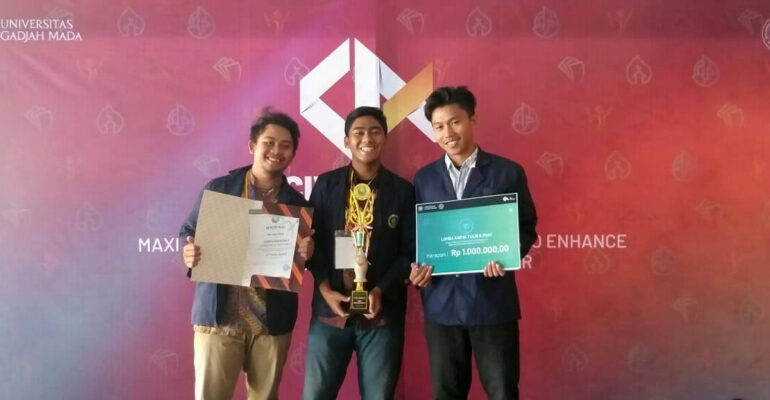IPB University Students Create Rumangka, An Eco-Friendly Home

Three students of the Department of Civil and Environmental Engineering (SIL), Faculty of Agricultural Technology (Fateta), IPB University namely Akhmad Nabil Punggawa, Hilman Ridho Rahman, and Muh. Irham Sahana initiated an Eco-drainage-based Home (Rumangka) based on water conservation efforts in the city of Bogor.
“This idea is also a fulfillment of the Sustainable Development Goals 2030 standard. The formula guarantees sustainable energy consumption and production patterns and ensures the availability of sustainable water management and sanitation,” Nabil said.
Rumangka has four superior systems namely green roof, natural lighting, rainwater treatment systems, and domestic waste treatment. The green roof system applies an urban farming system, which is planting on the roof of the house by utilizing engineering and the theme of Evaporative Cooling. The use of an insulator membrane in a green roof system is useful to cool the room underneath it to reduce the temperature by two degrees during the day and one degree at night.
Another system is natural lighting. This system utilizes the openings of the house to be reproduced, thus saving the use of lights. The lights used in this house are LED energy-saving lamps. The lamp can save costs by 121 thousand rupiahs per month.
The third system is the use of Rainwater Utilization Systems (SPAH) which can substitute 48.9 percent of household clean water use. Rainwater substitution can only be used to flush toilets, wash dishes, water plants and wash vehicles.
The last system is the processing of domestic waste (liquid and solid waste). Liquid waste has two types, namely black water and gray water. Blackwater waste is waste from the bathroom and will be treated using a septic tank technique with a biority system. Gray water waste comes from water used for washing dishes and clothes that will be treated using a portable fiberglass grease trap system. For solid waste, it will be treated as compost. Composting of organic waste can produce a profit of 340 thousand rupiahs per month.
In addition to the four flagship systems, Rumangka also adopts the Eco-Drainage system. This system uses bioretency. “A kind of infiltration well on the sidewalk and its function is indeed almost similar to infiltration well. The difference is on the left and right of bioretence planted with plants. When there is water that enters the biorensience to meet the volume of the well, the water can be stored to irrigate the plants around the biorensience during the dry season. It can also be used to transfer water in the ground, “Nabil said.
Through this idea, Nabil and his team won the First Place in the 8th Civil in Action event entitled “Maximizing Civil Engineering Technology to Enhance Awareness of Natural Disaster”. The event was held by the Civil Engineering Student Family of Gadjah Mada University (KMTS UGM) in Yogyakarta.
“This idea is as proof and introduction that Civil Engineering and Environment IPB University can compete with other civil engineering students in Indonesia,” Nabil said. (AVR)
Keyword: Rumangka, Green House, Civil Engineering



